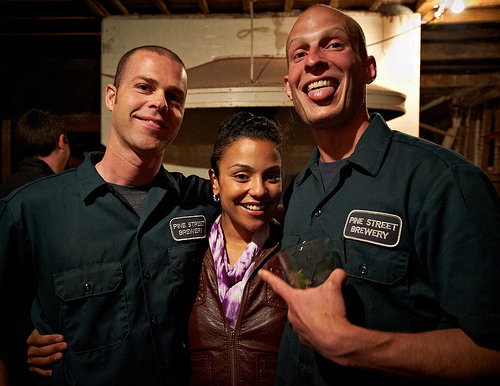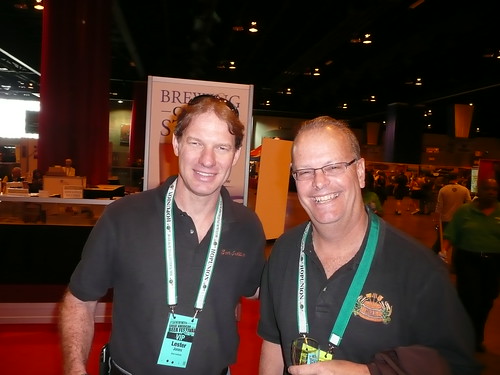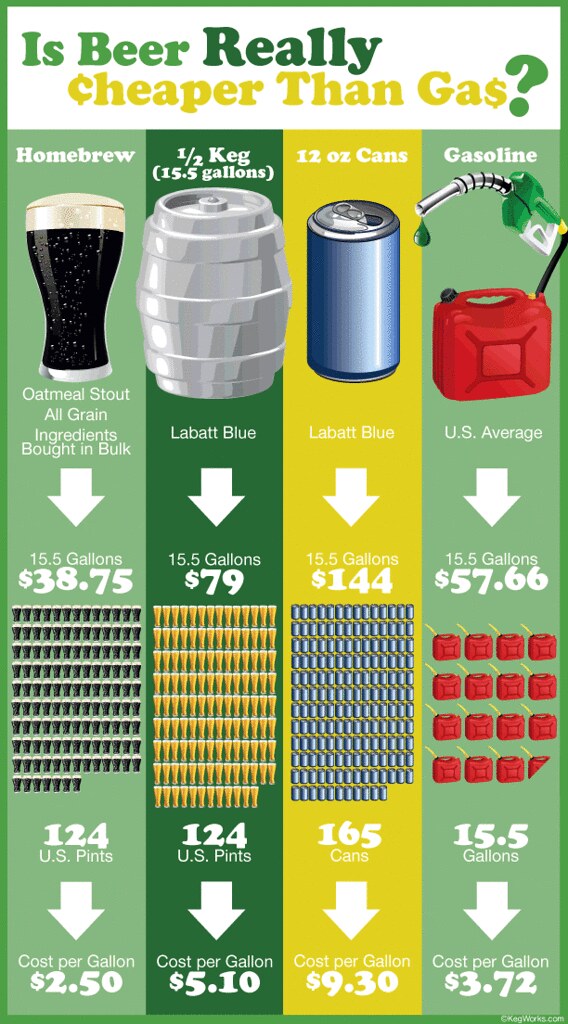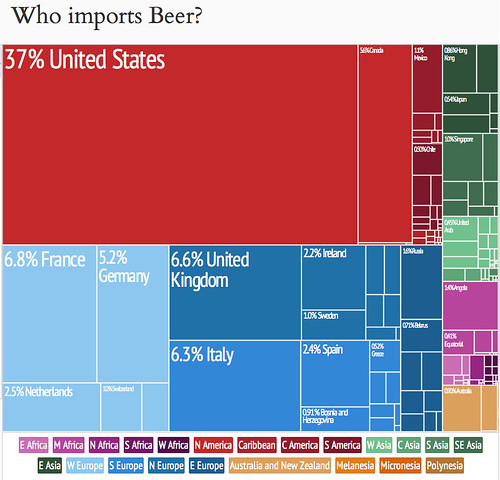
Today’s infographic is an interesting treemap created by the Observatory of Economic Complexity, a collaboration between M.I.T. and Harvard. This one shows the amount of beer imported by the nations of the world, with the size of their relative amount of importing shown by the size of the rectangle.
The High Life: A Tower of Beer For Your Retirement
![]()
Today’s infographic is a funny one, created by Roth IRA to show just how much beer you could sock away if you “save just $1 per day starting at age 25.” I guess my tower would be significantly shorter. Called The Awesome Tower of Beer, which by age 70 would be 5,736 feet tall.
Pine Street Brewery Needs Your Help

One of San Francisco’s newest beer companies, Pine Street Brewery, is building its own brewery and trying to expand its business. One of things they’re in desperate need of is tap handles and kegs. So they’ve turned to Indiegogo (a crowdfunding website similar to Kickstarter) to help raise the funds they need to grow. They’re offering various tchotchkes for different levels of financial support, as detailed in the Indigogo Pine Street Brewery web page.
With our recipes perfected and a commercial brewing space secured, we need tap handles and kegs to keep up with growing demand in San Francisco! With your help we can provide our city with enough green PSB handles to have our beer in every neighborhood.
We’ve brainstormed hard to come up with great incentives for your donations – just a small token of how much we appreciate your generosity. (Check the gallery for photos of the prizes: http://www.indiegogo.com/projects/pine-street-b…). Your contributions will help us establish our presence in the city, and we hope you’ll be proud to say you helped make it happen!

The Pine Street Brewery founders.
The Pine Street Brewery Story
Our Story – Pine Street Brewery from Pine Street Brewery on Vimeo.
Beer Taxes By Lester Jones Of The Beer Institute

A couple of months ago, the Tax Foundation interviewed Lester Jones, who’s the economist for the Beer Institute in Washington, DC. As I am a great fan of the dismal science, Lester’s become a good friend over the years and is a great asset to the beer industry. Tax Foundation host Richard Morrison describes the podcast interview. “Beer Institute Chief Economist Lester Jones explains the tangled web of federal, state, and local taxes that get applied to the beer we drink.”
If that doesn’t work, try listening to it directly on the web.

Lester Jones, at GABF a few years ago, with George Reisch of ABI.
The Alcohol Industry

Today’s infographic is about the Alcohol Industry, and whether or not it’s recession-proof. It was created by Total DUI’s Check Points blog. I’m not sure what their angle was, but they pretty much came to the same conclusion most analysts did, which is that it’s more recession-resistant than recession-proof.

Click here to see the infographic full size.
Is Beer Really Cheaper Than Gas?
![]()
Today’s infographic answers the age-old question, Is Beer Really Cheaper Than Gas? Created and investigated by Keg Works, who came to following conclusion, which is that the claim only works for homebrew. I guess we won’t see any beer-powered cars anytime soon.

Click here to see the infographic full size.
Ignoring Economies of Scale

As the news keeps swirling around the possible — I say inevitable — buyout of Grupo Modelo by Anheuser Busch-InBev in a breathless “will they, won’t they” kind of coverage, I’m utterly fascinated by the theater of it all. It’s especially interesting to see the many “business experts” weighing in with no real understanding of the history of the brewing industry or how it all works. These “instant experts” all seem to assume that general economics or business principles apply equally well to every scenario, yet fail to grasp that alcohol has always navigated a different path through the economic world, with extra layers of taxation, legislation and law, its moral or anti-alcohol critics, and has to abide by at least 51 sets of laws (federal laws plus one for each state). I brought this up last month in The Beer Monopoly, but this morning an economics reporter from the New York Times, Adam Davidson, weighed in with his own take on the shenanigans.
In his It’s the Economy column published today, Are We in Danger of a Beer Monopoly?, he gives his own version of reality. In his world, where there are nearly 2,400 American breweries, he at least admits many of them are “tiny,” but goes on to claim that a few “have become large national brands.” National, yes, but “large” is a somewhat relative term. They’re large compared to a tiny nanobrewery or even an average sized brewpub, but the volumes of beer manufactured by ABI and SABMIller are in another class altogether. All 2,398 of the other breweries represent much less than 10% of the total beer produced in the U.S., meaning there’s a fairly wide chasm between the two groups, even if “a handful” of them have been successful. Measured against the domination of the biggest two, even the most successful seem modest by comparison.
But this is an argument that many economists seem to make, and indeed it’s the same argument that ABI always makes when they’re trying to buy another global company. How can there be a monopoly with so much competition? Just walk down the beer set in an average grocery store and, if you know who owns or controls what, you’ll easily see who’s winning the beer wars. The power wielded by ABI and SABMiller is so far above that of any smaller brewer, or even the total of all of the smaller ones, that it really is a true David and Goliath relationship. Sure, the big guys throw a few crumbs to the little guys nipping at their heels, but they don’t feel seriously threatened by them. Lately, they’ve been paying closer attention because they’re losing incremental marketshare, but they’ll respond to any such loss, because it hurts the share price. But saying they’re on equal footing is the economic equivalent of pretending that employees and employers have equal bargaining power, as most economic textbooks continue to insist.
But here’s Davidson’s takeaway from recent events as ABI tries to win approval for buying Grupo Modelo. “So I was surprised to learn that the Justice Department is worried that Anheuser-Busch InBev, the conglomerate that owns Bud, is on the cusp of becoming an abusive monopoly.” That’s almost spit take worthy. “On the cusp?” ABI has been a de facto monopoly with one or two others for decades, all but controlling the marketplace, not that anybody has been particularly concerned in the business world.
Anyone who hasn’t had their head buried deep in the sand for last few decades has to have noticed that we live in a society utterly dominated by business interests. Business power is the only power that matters. Political power takes a back seat to it and the will of the people is something politicians invoke only when they’re trying to get elected. How else can you explain that corporations have all the benefits of being a person, with none of the responsibilities or consequences? How else can money be considered free speech to influence politics? How else can you explain the many businesses deemed too big to fail while the same individuals those corporations ruined are left swinging in the wind, with no life raft for the ordinary flesh and blood person.
Davidson goes on to give a flawed history of the brewery business, and seems to think that mergers are a relatively new phenomenon. Of course, brewery mergers and acquisitions have been going on in brewing since the late 19th century, and stopped only briefly for about thirteen years, during Prohibition. Then he says we’re “still in the very early stages of what appears to be a global version of the scale-based consolidation we’ve seen in the United States over the past century.” I can’t tell if that’s a joke? The global beer world has been dominated by an ever-shrinking group of very large conglomerates for at least the last three or four decades. It’s hardly a new thing. In 2010, the four largest beer companies accounted for over half of all beer worldwide, and according to another source the Top 5 were about half. Heineken, Carlsberg, and a few others are very large companies, indeed, and they, too, have been gobbling up breweries around the world for many, many years.
It’s probably not a coincidence that Davidson has his own S.H.A.M.E. profile. Why the New York Times continues to let him shill for big business, well’s that’s a whole other discussion, but it’s obvious he’s defending the pro-business position. It’s also clear that he’s part of the theater that will ultimately end in the DOJ’s approval of the deal between ABI and Grupo Modelo. Here’s my prediction of what will happen next. As always happens, the two parties will hammer out a compromise that was probably the deal everybody wanted in the first place, but this way both parties look good in the public eye. The DOJ will look like they’re being tough on big business and are protecting the public while ABI will look good because they were able to get the deal done, and their share price will shoot up. Everybody wins. As Shakespeare observed, “all the world’s a stage.” And we’re the audience. I just wish they’d stop pretending we’re all idiots.

The Price Of Beer Around The World
![]()
Today’s infographic tackles the Price of Beer Around the World. Djibouti has the highest priced beer while Panama has the cheapest.
Working For A Beer

How long do you think you have to work before you can have a beer? I don’t mean how long before you think it’s time to take a break and enjoy a pint. No, I mean how long do you think you have to work in order to earn enough money to buy yourself a beer?
In the Economist’s Daily Chart, Thirsty Work, they detail the efforts of analysts at the Swiss Bank UBS to figure out how long the average German worker would have to work in order to buy him- or herself a half-litre of beer at Oktoberfest. They discovered that it would take “just under seven minutes of work.” But it’s not the same in every nation, as the chart below details. The avergae appears to be about 20 minutes of work for a beer, which doesn’t seem too bad. The worst place was India, where you’d have to work “nearly an hour” to make enough for a beer. The United States, I’m happy to say, is at the bottom, which is a good thing. It only takes us about 5 minutes to earn enough for a beer. Hell, I think I earned two beers just writing this post.

Beer Good For Economic Growth Worldwide

My wife’s a political news junkie and reads such arcane fare as Foreign Policy, a magazine covering global politics and economics. She forwarded me Chug for Growth , an article detailing how the beer industry is having a positive effect on economies around the world, especially in emerging nations. Here’s how it begins:
The myth of the smug teetotaler is no joke. Many of the most popular theories of economic growth in wealthy countries, dating back to the Protestant work ethic of Max Weber, emphasize the abstemious and sober virtues of the well-to-do. And from the 18th-century Gin Acts in Britain to Prohibition in 1920s America to a certain class of modern-day economists, there’s a long tradition of blaming intemperance for the persistence of poverty.
But in fact, mounting evidence suggests that beer in particular, and the beer industry that surrounds it, may be as good for growth as excess sobriety. In some of the world’s toughest investment climates, beer companies today are building factories, creating jobs, and providing vital public services, all in the pursuit of new customers for a pint. It’s the brewery as economic stimulus: a formula even a frat boy could love.
The article goes on to detail how beer is good for both the big brewers and the local economies where they’re building or acquiring new breweries. They can add “tax revenue, lease payments, numerous local jobs, and increased demand for local agricultural produce.” And it sells even in the most challenged economies, as “even the poorest of the poor will spend money on alcohol.” I could have done without the lecture on alcohol abuse, while of course ignoring the positive health benefits of moderate consumption, but apart from that it makes a strong case for beer not only being recession-proof, but even a recession-beater in some places.
The article concludes with some interesting speculation about economic growth centuries ago, and whether it, too, may have been caused not, as been previously thought, by the Christian work ethic, but by breweries themselves as is happening today.
Indeed, beer may have been a force for growth for a long time. [Researchers] Colen and Swinnen note that beer consumption is higher in Protestant countries. What if the early success of Protestant-dominated economies wasn’t about Weber’s famed work ethic at all, but about the impact of breweries? Of course, it may be just as outlandish to argue that progress is driven by hops and barley as by the fear of eternal damnation — but at least it’s more fun to discuss over a pint.
I’m all for that.


